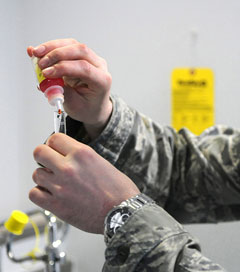Honest, paywall-free news is rare. Please support our boldly independent journalism with a donation of any size.
Radiation is expected to continue spewing for months from Japan's Fukushima Daiichi nuclear power plant that suffered a meltdown following an earthquake and tsunami in March, but despite grim reports from Japan, the US Environmental Protection Agency (EPA) has quietly stopped running extra tests for radioactive material in America's milk, rain and drinking water.
The EPA initially ramped up nationwide testing in the weeks following the disaster in Japan, and radioactive materials like cesium and iodine-131 were detected on US soil. Citing declining levels of radiation, the EPA has abandoned the extra tests, even as reports from Japan indicate that the Fukushima plant continues to emit radiation and the disaster is one of the worst in world history.
The EPA posted a statement online saying it would return to routine testing on May 3, but the agency did not send out a press release. The media widely ignored the change, even as Japanese officials admitted just weeks later that they were battling a full nuclear meltdown.
In March and April, samples of milk, rain and drinking water from across the country tested positive for radiation from the Fukushima plant. The radiation fell in rain across the US and was absorbed by plants and dairy cows.
The EPA insisted that the radiation levels were too low to cause public health concern, but Truthout identified gaps in the agency's data and nuclear critics said the EPA has failed to acknowledge that even small amounts of radiation could be dangerous.
Now the EPA has returned to routine testing of milk and drinking water once every three months and testing rainwater once a month. The EPA continuously monitors background radiation with more than 100 air filter monitors, but nuclear critics say more testing should be done.
“The Fukushima disaster is unlike any nuclear accident we have ever had,” said Dan Hirsch of the nuclear watchdog group Committee to Bridge the Gap. “We haven't had anything that has gone on for a year, and that is what the Japanese authorities are predicting – if they're lucky. It might even take longer. The fuel has melted through, there are breaches at the containment structures, and there are constant radioactive releases.”
Radiation levels in the US have declined, according to the EPA, but the agency has not released data on samples taken after April 30, making the results nearly two months old, according to data sets made public by the agency.
The EPA typically releases test results two to four weeks after a sample is taken, and the EPA has not released new data on milk since May 24. On June 1, the EPA reported that the radionuclide cesium-137 was detected in one sample of drinking water, and two weeks later the same round of samples were clear of radiation.
“The easiest way to not have any concern over data is to have no data at all,” said Hirsch, who is critical of the cozy relationship between the US government and the domestic nuclear industry. “I think the system is there to say they have a system, but not to report any data that would undermine public support for nuclear power.”
The EPA says it's prepared to accelerate its testing if necessary, but so far, its air monitoring system shows no cause for concern.
Hirsch wants the EPA to broaden its efforts and test food and agricultural products for any bioaccumulation of radioactive material in plants, animals and livestock. Hirsch also said that the EPA did little testing for strontium 90, a dangerous radionuclide with a 20-year half-life and the ability to mimic calcium and accumulate in bones.
The EPA claims that the levels of radiation it did detect in recent months were not high enough to raise public health concerns. But how high do radiation levels have to be before the government takes action?
For food products like milk, the EPA relies on Derived Intervention Levels (DIL) set by the Food and Drug Administration (FDA). DILs provide agencies with guidelines – not mandates – as to when the government should take action to keep food contaminated by radioactive material out of the hands of consumers.
A DIL “does not define a safe or unsafe level of exposure, but instead a level at which protective measures would be recommended to ensure that no one receives a significant dose,” according to the FDA web site. The DIL for iodine-131, one of the radioactive materials released from Japan, in food products like milk is set at 170 becquerels per kilogram. That number is 1,500 times higher than another government standard, the Maximum Containment Level for iodine-131 in drinking water, which is set by the Safe Drinking Water Act.
“[DILs are] a guidance as to when an emergency action should taken to intervene, but these are in no way to be considered safe levels,” Hirsch said.
Hirsch said that DILs are “very inflated” and meant for emergency situations like the detonation of a dirty bomb or a nuclear meltdown. DILs help officials with “triage” during an emergency, but according to the EPA, the only emergency is thousands of miles away in Japan.
Media that fights fascism
Truthout is funded almost entirely by readers — that’s why we can speak truth to power and cut against the mainstream narrative. But independent journalists at Truthout face mounting political repression under Trump.
We rely on your support to survive McCarthyist censorship. Please make a tax-deductible one-time or monthly donation.
